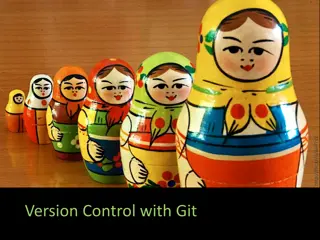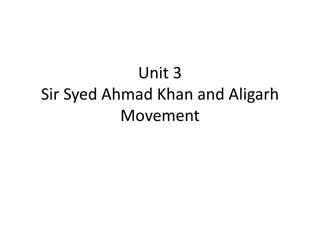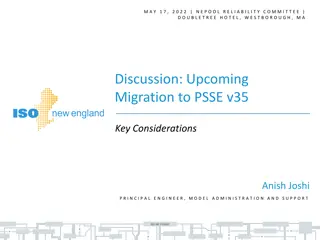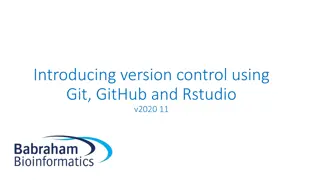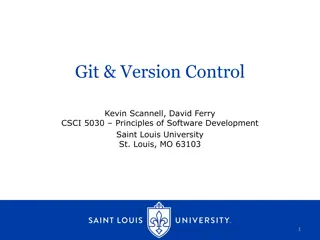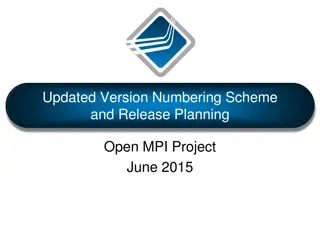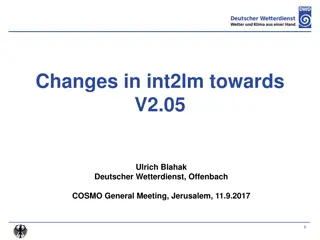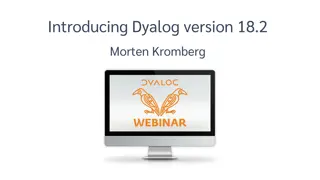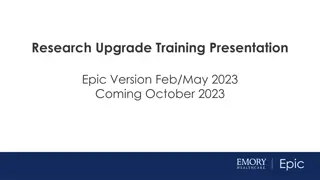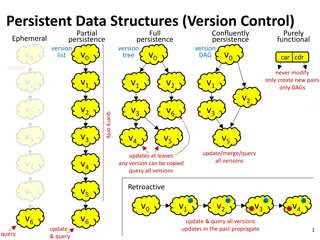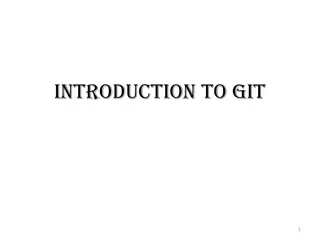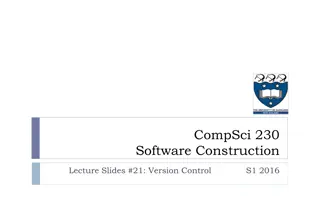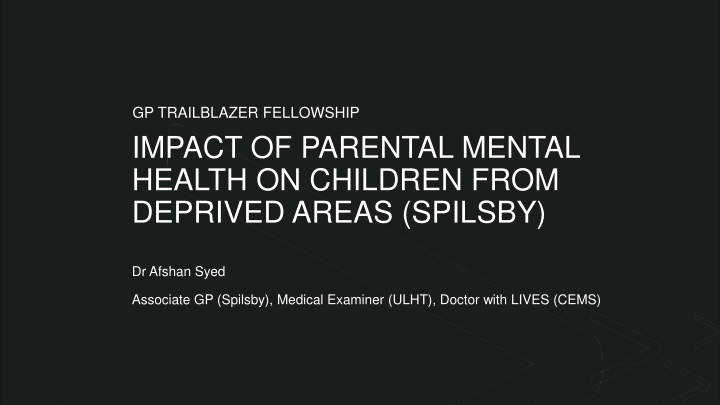
Impact of Parental Mental Health on Children in Deprived Areas: Trailblazer Fellowship Study
Explore the GP Trailblazer Scheme focusing on health inequalities, the aims of the Trailblazer Project, and the impact of parental mental health on children in disadvantaged areas like Spilsby. Gain insights into the prevalence of mental health disorders in children with parents facing Severe Mental Illness (SMI) and the awareness of clinicians regarding this issue. Discover the significant need for mental health services among young people in Lincolnshire, despite disparities in deprivation levels.
Download Presentation

Please find below an Image/Link to download the presentation.
The content on the website is provided AS IS for your information and personal use only. It may not be sold, licensed, or shared on other websites without obtaining consent from the author. If you encounter any issues during the download, it is possible that the publisher has removed the file from their server.
You are allowed to download the files provided on this website for personal or commercial use, subject to the condition that they are used lawfully. All files are the property of their respective owners.
The content on the website is provided AS IS for your information and personal use only. It may not be sold, licensed, or shared on other websites without obtaining consent from the author.
E N D
Presentation Transcript
GP TRAILBLAZER FELLOWSHIP IMPACT OF PARENTAL MENTAL HEALTH ON CHILDREN FROM DEPRIVED AREAS (SPILSBY) Dr Afshan Syed Associate GP (Spilsby), Medical Examiner (ULHT), Doctor with LIVES (CEMS)
What is the GP Trailblazer Scheme? 'The Trailblazer scheme allows motivated, qualified clinical staff to work in practices in areas of socio-economic deprivation. The aim is to develop the skills, knowledge, experience, and resilience to stay working in these challenging, but incredibly rewarding environments and to help practices in understaffed areas to recruit and retain clinicians. Lincolnshire Training Hub
What are Health Inequalities? 'Health Inequalities are unfair and avoidable differences in health across the population, and between different groups within society. This includes how long people are likely to live, the health conditions they may experience and the care that is available to them' (NHS England). The Core20Plus5 approach identifies the 5 clinical areas of focus requiring accelerated health improvement.
Aims of the Trailblazer Project To look at ; prevalence of mental health disorders in children living in household of adults with Severe Mental Illness (SMI); clinician s awareness of the impact of adult's mental health on children and whether they proactively ask about it.; clinician s awareness of any voluntary/funded services available to children/households of adults with SMI.
Why? Lincs CYP living in 'poverty' aligns to national averages; 20%+ in all Districts, 6.5% Lincs CYP live in most deprived areas in UK- East Lindsey most deprived area in Lincs. Demand for mental health services doesn't align to deprivation-Lincs least deprived wards have the highest demand In Lincolnshire, CYP disproportionately experience 'health inequalities' compared to adults Most lifelong mental illness is established by adolescence More CYP than ever are struggling with their mental health CYP mostly access the online counselling services out of hours, Lincoln and Boston have the highest usage-the need of CYP are reported to be higher and they want support for longer CYP are mostly referred for anxiety and stress across early intervention services (Kooth, Health Minds). Age 14/15 average age open to services. Females more likely to be referred than males 2K+ CYP are known carers for parents/carers with a mental illness Parents and carers are making most referrals to LPFT services. Approx 30% referrals are not accepted first time mainly due to lack of information Lincs has lower hospital admissions for CYP mental health and less inpatient admission than region/national
Methodology A SystmOne search was carried out based on following criteria: 'Adults on SMI Register and with children <16 years in the household' Initial search returned 54 results. Of these 20 were excluded either due to being wrongly coded (11), LD patient (4), no children registered at the same address (4), or in Jail (1) . Post codes were separated according to deciles 2-4 (most deprived) vs deciles 5-6 (less deprived) The following questions were looked at: 1: has the child presented with any mental health concerns 2: has the parent/guardian raised any concerns about the mental health of the child 3: in last 3years, has the clinician (GP/ANP/FCMHN) asked about the impact of adult's mental health on child A confidence rating scale was carried out for available Clinicians in Spilsby
Results A total of 60 CYP were included (42 from deciles 2-4 compared to 18 CYP in decile 6. In deciles 2-4, a higher number of parent/guardians raised concerns about mental health for their child, in comparison to only 2 in decile 6 who raised concerns. Overall, results show that a higher number of children in deciles 2-4 did not present with mental health concerns, although 11 of the CYP did present with mental health concerns.
Results A total of 60 CYP were included (42 from deciles 2-4 compared to 18 CYP in decile 6. In deciles 2-4, the results showed that all clinicians (42) did not ask about the mental health of the child in the last 3 years. Results also showed a high proportion of clinicians not asking the question in decile 6. In deciles 2-4, the results showed similar results amongst yes/no responses. However, in decile 6, it showed that clinicians were less likely to asked about the impact of the adults mental health.
Results Clinical Confidence Rating 10 Responses received. Of the 10 responses: 60% of clinicians do not proactively ask about the impact of adult's mental health on children (if applicable). 70% of clinicians are not aware of any voluntary or funded services available to children/households of adults with psychiatric disorders. Limitations: Small sample size Dependence on appropriate read code being used by the clinician, this was minimized by reviewing the notes 3 years retrospectively
Brief Discussion Despite the small size, findings confirm that adults from deprived area are more likely to be on SMI register ,and that the children living in such households are more likely to experience mental health concerns from a young age. LPFT Family Hub work has identified a lack of 0-5 Mental Health support in Lincolnshire and are working on a project to help improve that gap Currently, all families are offered antenatal face2face appointments thru Family Hubs, using Universal Health Model. This is usually provided by Health Visitor in a group setting, though 1:1 sessions can be offered to eligible families under Mellow Bumps scheme. The following services are available to early years: Universal Health Visitor service (antenatal, primary birth visit and 2 year health check , all of which is voluntary). MDT involving SALT, Health Visitor and LPFT. Portage Scheme is available for children who show developmental challenges. LCC is currently working on a CYP Mental Health Transformation Program Ideally, a Family Support Unit is needed which should include Health Visitor, Early Help Worker, Early Years worker, LPFT, Police, Probation Service, Safeguarding Team, SALT, OT, Substance Misuse Worker.
Recommendations Raise clinician awareness about impact of parental mental illness on children by engaging in training and teaching In House as well as wider. Aim to do a post teaching Clinician Confidence Rating survey Seven Minute Briefs sent out to Lincolnshire Safeguarding Board, Lincolnshire LMC, GP VTS Program Director , SMI Steering Group. Aim to offer teaching session to trainees/shared with LMCs and to also include this as part of Level 2/3 safeguarding teaching System One SMI Mental Health Template-currently engaging with the Developers to see if a Read Code can be added to CYP S1 record when an adult is diagnosed with SMI, and add a checkbox in the template to say if the clinician has asked about the impact on CYP Findings shared with LCC Children's Services. There is a clear need for Early Intervention within Lincolnshire. LCC Children's Services is picking this up under CYP Mental Health Transformation and will make recommendation to Commissioners, which will be subject to decision making and funding being agreed All the current services are focused on helping the CYP who is already in established crisis. We want to proactively identify the at risk CYP and offer support and help to prevent mental health deterioration. Ideally, we need a Family Support Unit which should have an MDT approach.
Take home message Remember these 2 questions during mental health consultations: 'how is your current mental ill health affecting your relationship with your child?' 'are you concerned about the mental wellbeing of your child?'
Resources and Acknowledgement Home | One You Lincolnshire Tim Jackson (Spilsby IT/Data Co- ordinator), Melissa Wong (Health Inequalities Improvement Facilitator ICB) and Emma Townend (Health Inequalities Improvement Manager) for their continued support and advice. 01_11130_Prelims.indd (publishing.service.gov.uk) Guide to implementing family skills training programmes for drug abuse prevention (unodc.org) James Thompson (Mentor) for his wisdom. Charlotte Gray (LCC Head of Service Children's Strategic Commissioning)



